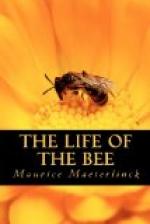Have we the right to conclude, from the dangers of parthenogenesis, that nature is not always able to proportion the means to the end; and that what she intends to preserve is preserved at times by means of precautions she has to contrive against her own precautions, and often through foreign circumstances she has not herself foreseen? But is there anything she does foresee, anything she does intend to preserve? Nature, some may say, is a word wherewith we clothe the unknowable; and few things authorise our crediting it with intelligence, or with aim. That is true. We touch here the hermetically sealed vases that furnish our conception of the universe. Reluctant, over and over again, to label these with the inscription “Unknown,” that disheartens us and compels us to silence, we engrave upon them, in the degree of their size and grandeur, the words “Nature, life, death, infinite, selection, spirit of the race,” and many others, even as those who went before us affixed the words “God, Providence, destiny, reward,” etc. Let it be so, if one will, and no more. But, though the contents of the vases remain obscure, there is gain at least in the fact that the inscriptions to-day convey less menace to us, that we are able therefore to approach them and touch them, and lay our ears close to them and listen, with wholesome curiosity.
But whatever the name we attach to these vases, it is certain that one of them, at least, and the greatest—that which bears on its flank the name “Nature”—encloses a very real force, the most real of all, and one that is able to preserve an enormous and marvellous quantity and quality of life on our globe, by means so skilful that they surpass all that the genius of man could contrive. Could this quantity and quality be maintained by other means? Is it we who deceive ourselves when we imagine that we see precautions where perhaps there is truly no more than a fortunate chance, that has survived a million unfortunate chances?
[80]
That may be; but these fortunate chances teach us a lesson in admiration as valuable as those we might learn in regions superior to chance. If we let our gaze travel beyond the creatures that are possessed of a glimmer of intellect and consciousness, beyond the protozoa even, which are the first nebulous representatives of the dawning animal kingdom, we find, as has been abundantly proved by the experiments of Mr. H. J. Carter, the celebrated microscopist, that the very lowest embryos, such as the myxomycetes, manifest a will and desires and preferences; and that infusoria, which apparently have no organism whatever, give evidence of a certain cunning. The Amoebae, for instance, will patiently lie in wait for the new-born Acinetes, as they leave the maternal ovary; being aware that these must as yet be lacking their poisonous tentacles. Now, the Amoebae have neither a nervous system nor distinguishable organs of any kind. Or if we turn to the plants, which, being motionless, would




